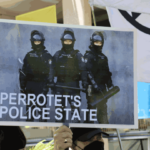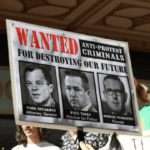Value Democracy? Vote Progressives for NSW, as Majors Double Down on Dissent

This time last year was marked by a surge in nonviolent climate action being taken in Sydney, the capital of a state that had fast become a frontline of the climate crisis, following years of extreme drought and wildfires, with an onslaught of unprecedented flooding only then having just begun.
But instead of finally responding to rising community want and acting to abate the escalating crisis caused by fossil fuel use, the Perrottet government, with bipartisan approval from the Minns opposition, rolled out one of the most draconian antiprotest regimes on the planet.
So, as NSW goes to the polls this week, and following last week’s further backlash against the crackdown on the democrat right to express opinion, both the Liberal and Labor leaders have committed to continuing to drown out climate defenders to the benefit of their fossil fuels donors.
The protest laws are now being applied to other social justice causes as well, which was evidenced with the last night arrest of university student Cherish Kuehlmann over having demonstrated the housing crisis.
And this silencing of dissent on the part of the majors serves to preserve the existential threats entrenched in the system.
However, the NSW Greens and other progressive parties are fundamentally opposed to the extreme antiprotest regime, and they’re committed to taking the necessitated action on climate and to combating increasing social inequities.
Indeed, a vote for progressives this weekend sees constituents attempting to forge a viable future.
Reclaim the right to protest
The current NSW antiprotest laws were jammed through parliament with bipartisan approval early last April. However, last week saw NSW District Court Judge Mark Williams overturn the 15 month sentence imposed upon activist Violet Coco, which served to reject the severity of the crackdown.
Rather than heed this call though, or that of the heightened civil society campaign against the regime, NSW premier Dominic Perrottet reaffirmed his party’s position on disruptive protest, while Labor leader Chris Minns confirmed he’d keep the extreme laws in place on taking office next week.
In stark contrast, the NSW Greens has committed to not only revoking last year’s extreme protest laws, but it plans on repealing all such antiprotest measures that the Coalition has enacted with bipartisan approval since 2014, and it’s pledged to enshrine the right to protest in state law.
In its policy position, the Greens recognise that “acts of nonviolent civil disobedience are vital parts of a mature and responsible democracy and we need to act to protect these fundamental rights”, and it also makes clear that the crackdown has spurred numerous incidents of police overreach.
Balance of power
The May 2022 federal election and that in Victoria last November were marked by “greenslides”, as voters shifted away from both majors to vote for the Greens and other progressive minor parties, as well as teal independents.
This shift was spurred by a lack of action on climate and rising government corruption, and the NSW majors have failed to show any progress on these issues in the interim, while at the federal level, Labor has shown it’s only willing to be seen to be acting on climate as it expands fossil fuels.
The NSW Greens, however, is aiming to secure at least seven seats in both houses this Saturday, providing it with balance of power within a minority government, which would mean that the major that is in office would have to negotiate favourably with the progressive party to pass laws.
Another key reason to vote progressive is that if One Nation or the Shooters, Fishers and Farmers party picks up another seat in the upper house, it would hold balance of power, which would serve to solidify the shift towards the authoritarian, where policy is dictated and nonnegotiable.
NSW One Nation leader Mark Latham has gone as far as to exploit a loophole in the state electoral regime, which permitted him to quit his position in the upper house, pass on that seat to a fellow party member and then run again for another seat in this state election.
Latham plans to repeat the same agenda he progressed in the last NSW parliament, which comprises of lifting bans to enable uranium mining and the opening of new nuclear reactors, erasing the identity of trans children in the schooling system and raising Christian liberties above all others.
Keeping the bastards democratic
Whilst ending the 12 year rule of the Coalition is top of much of the constituency’s want list this election, recent federal Labor policy moves involving climate abatement and the AUKUS agreement have revealed that it needs to be kept in check as a party that’s shifting even further to the right.
The Greens and other progressives, such as Socialist Alliance and Elizabeth Farrelly Independents, are making a firm commitment to see the antiprotest regime torn down, so as to progress action on climate, as well as to restore the democratic principles that once underpinned our constituency.
So, as the last session of NSW parliament was characterised by unprecedented extreme weather and a surge in authoritarian practices and opinion, the need to vote progressives into parliament is right now more vital than ever, as this state’s current political trajectory embraces societal collapse.







